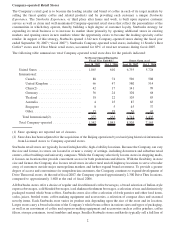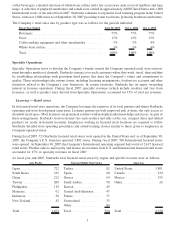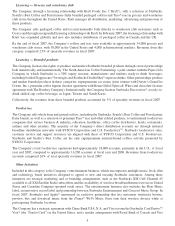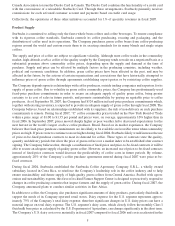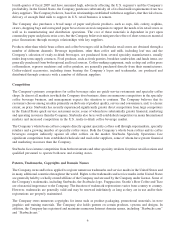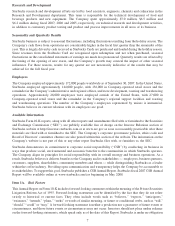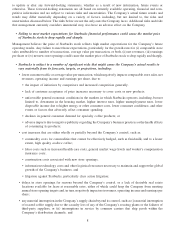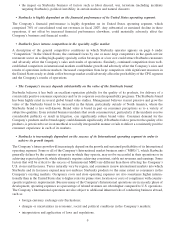Starbucks 2007 Annual Report Download - page 14
Download and view the complete annual report
Please find page 14 of the 2007 Starbucks annual report below. You can navigate through the pages in the report by either clicking on the pages listed below, or by using the keyword search tool below to find specific information within the annual report.•Significant increases in the market price or decreases in availability of high quality arabica coffee or
fluid milk could harm the Company’s business and financial results.
A discussion of the sources and availability of coffee of the quality sought by Starbucks and fluid milk appears on
page 5 under “Product Supply.” Any significant increase in the market price or any significant decrease in the
availability of high-quality arabica coffee or fluid milk could adversely affect the Company’s business and financial
results.
•A regional or global health pandemic could severely affect Starbucks business.
A health pandemic is a disease that spreads rapidly and widely by infection and affects many individuals in an area
or population at the same time. If a regional or global health pandemic were to occur, depending upon its duration
and severity, the Company’s business could be severely affected. Starbucks has positioned itself as a third place
between home and work where people can gather together for human connection. Customers might avoid public
gathering places in the event of a health pandemic, and local, regional or national governments might limit or ban
public gatherings to halt or delay the spread of disease. A regional or global health pandemic might also adversely
impact the Company’s business by disrupting or delaying production and delivery of materials and products in its
supply chain and by causing staffing shortages in its stores. The impact of a health pandemic on Starbucks might be
disproportionately greater than on other companies that depend less on the gathering of people together for the sale,
use or license of their products and services.
•Starbucks relies heavily on information technology in its operations, and any material failure, inade-
quacy, interruption or security failure of that technology could harm the Company’s ability to effec-
tively operate its business.
Starbucks relies heavily on information technology systems across its operations, including for management of its
supply chain, point-of-sale processing in its stores, and various other processes and transactions. The Company’s
ability to effectively manage its business and coordinate the production, distribution and sale of its products depends
significantly on the reliability and capacity of these systems. The failure of these systems to operate effectively,
problems with transitioning to upgraded or replacement systems, or a breach in security of these systems could
cause delays in product sales and reduced efficiency of the Company’s operations, and significant capital
investments could be required to remediate the problem.
•Failure of the Company’s internal control over financial reporting could harm its business and finan-
cial results.
Starbucks management is responsible for establishing and maintaining effective internal control over financial
reporting. Internal control over financial reporting is a process to provide reasonable assurance regarding the
reliability of financial reporting for external purposes in accordance with accounting principles generally accepted
in the United States of America. Internal control over financial reporting includes: (i) maintaining reasonably
detailed records that accurately and fairly reflect the Company’s transactions; and (ii) providing reasonable
assurance that the Company (a) records transactions as necessary to prepare the financial statements, (b) makes
receipts and expenditures in accordance with management authorizations, and (c) would timely prevent or detect
any unauthorized acquisition, use or disposition of Company assets that could have a material effect on the financial
statements. Because of its inherent limitations, internal control over financial reporting is not intended to provide
absolute assurance that the Company would prevent or detect a misstatement of the Company’s financial statements
or fraud. The Company’s rapid growth and entry into new, globally dispersed markets will place significant
additional pressure on the Company’s system of internal control over financial reporting. Any failure to maintain an
effective system of internal control over financial reporting could limit the Company’s ability to report its financial
results accurately and timely or to detect and prevent fraud. A significant financial reporting failure could cause an
immediate loss of investor confidence in Starbucks and a sharp decline in the market price of its common stock.
12


